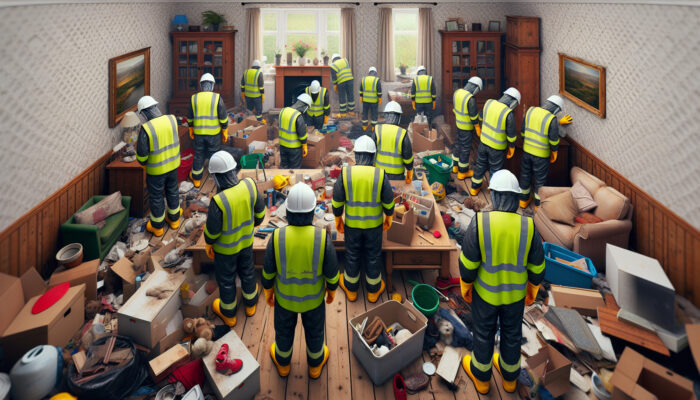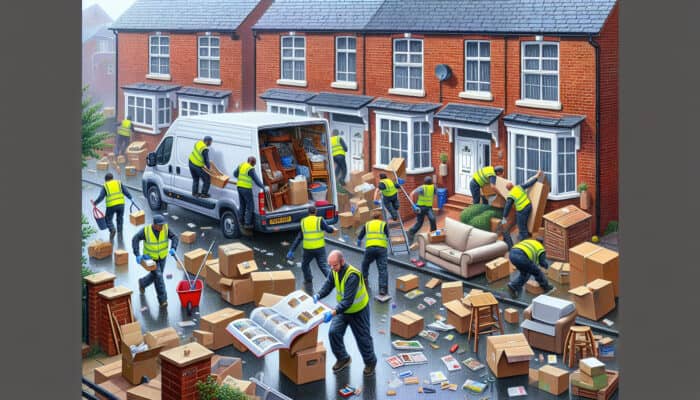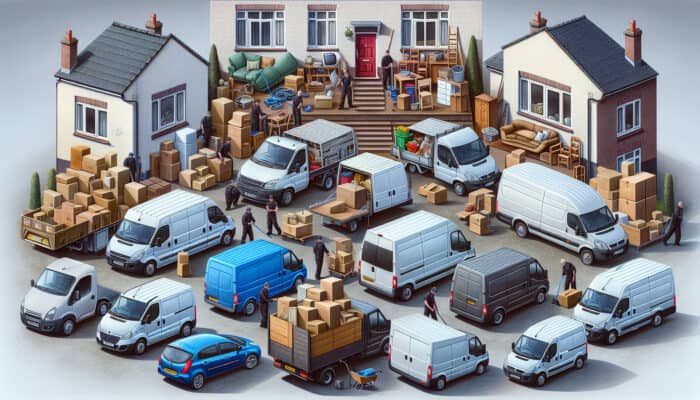Comprehensive Guide to UK Recycling Laws and Practices
In-Depth Insight into Waste Regulations
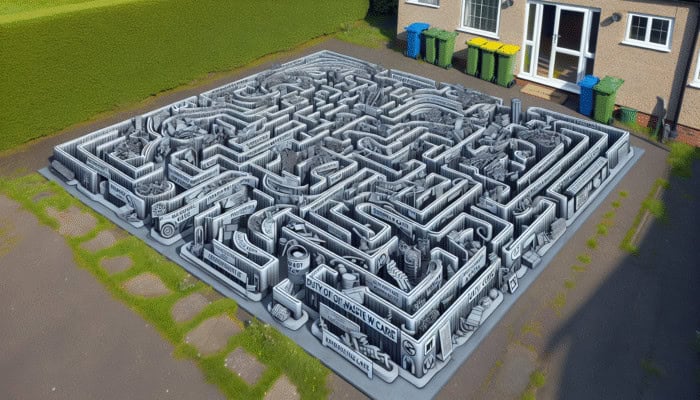
Legal Recycling Tips for House Clearance: Navigating the intricate landscape of UK waste regulations can initially appear overwhelming; however, understanding these laws is crucial, particularly during house clearance activities. The Environmental Protection Act 1990 serves as the cornerstone of waste management legislation in England, establishing the necessity for households to ensure proper disposal of their waste. This law imposes a strict duty of care on both individuals and businesses. Non-compliance can result in substantial fines and severe legal consequences, including the obligation to transfer any waste to a registered waste carrier to avoid penalties.
Local councils possess the authority to enforce specific guidelines that cater to the distinct needs of their communities. This may involve mandates for waste segregation or stipulated disposal sites. Therefore, it is imperative to thoroughly investigate your local council’s regulations before proceeding with a house clearance. Hiring a licensed waste carrier not only guarantees adherence to these laws but also fosters responsible waste management practices. By becoming well-versed in these regulations, you can enhance the efficiency of your clearance process while minimising the risk of incurring legal troubles.
Essential Considerations for Hazardous Materials
Recognising and appropriately managing hazardous materials is an integral aspect of any house clearance project. Items such as batteries, paints, and electrical goods can pose significant risks if not disposed of properly. These materials often contain substances that are detrimental to both environmental safety and human health. UK legislation, notably the Hazardous Waste Regulations 2005, stipulates that hazardous waste must undergo specific treatment and disposal processes.
Homeowners must be vigilant about identifying hazardous materials within their homes. For example, old paint tins, fluorescent light bulbs, and certain electronic devices necessitate special handling procedures. It is advisable to contact local recycling centres or hazardous waste disposal services to obtain guidance on the correct disposal methods. Always scrutinise labels and safety data sheets associated with products to fully comprehend their hazardous nature and adhere to the proper disposal protocols. This level of diligence not only protects the environment but also ensures compliance with UK regulations.
Understanding Local Authority Recycling Requirements
Each local council in the UK maintains its own unique set of recycling requirements, which can greatly influence your house clearance operations. Familiarising yourself with these specific guidelines is crucial for effective waste management. Local authorities typically provide resources on their official websites, outlining which materials can be recycled and which cannot, as well as the correct procedures for disposing of specific items.
In certain areas, councils may offer complimentary or low-cost collection services for bulky items, such as furniture or appliances. In contrast, others might require residents to transport these items to designated recycling centres. It is essential to engage with your local authority as early as possible in the clearance process. By doing so, you can determine whether they have any special initiatives or programmes designed to support recycling efforts during house clearances. Adhering to these guidelines not only reinforces local sustainability initiatives but also ensures compliance with the law.
Exploring Recycling Facilities Available to Homeowners
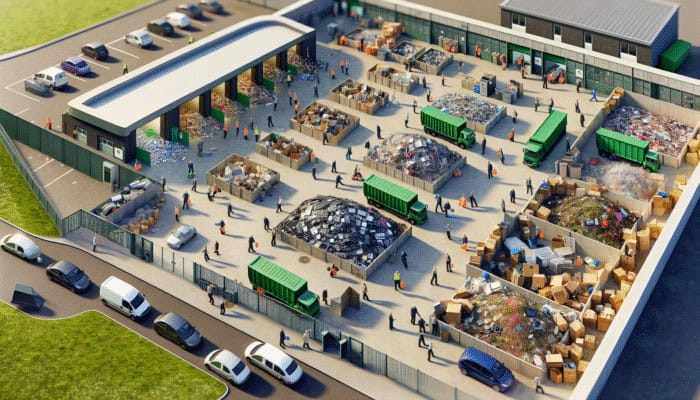
Identifying and utilising the appropriate recycling facilities is fundamental to responsible house clearance. The UK is equipped with a comprehensive network of recycling centres, each designed to manage specific types of materials efficiently. You can typically find information about these facilities on your local council’s website, which provides insights into the materials that can be recycled and their operational hours.
When planning your house clearance, consider the nature of the items you need to dispose of. Larger items, such as appliances, might necessitate a trip to a designated facility, while smaller items can often be conveniently disposed of in household recycling bins. Grasping the distinctions between various recycling facilities—such as those dedicated to electronic waste or garden refuse—can significantly streamline your clearance process. Furthermore, many facilities offer valuable guidance on how to properly sort and prepare materials, thereby enhancing the effectiveness of your recycling efforts.
Effective Sorting and Categorising of Items for Recycling
Identifying Types of Recyclable Materials
When embarking on a house clearance, it is imperative to recognise the diverse types of recyclable materials present. In the UK, commonly recyclable materials typically include paper, cardboard, glass, metals, plastics, and certain types of textiles. However, understanding what is recyclable and what is not is essential to prevent contamination, which could result in entire batches of recyclable materials being directed to landfills.
For example, plastic packaging frequently features recycling symbols that indicate their acceptability in your local area. Additionally, items such as electronics may require special handling due to their hazardous components. Conducting thorough research into your local recycling capabilities can significantly aid in maximising the recycling potential of your household items.
Moreover, numerous local charities and organisations welcome donations of recyclable items such as books, clothes, and furniture in good condition. By identifying these materials early in the clearance process, you not only enhance the efficiency of your operation but also support your community’s sustainability efforts.
Implementing Proper Sorting Techniques for Effective Recycling
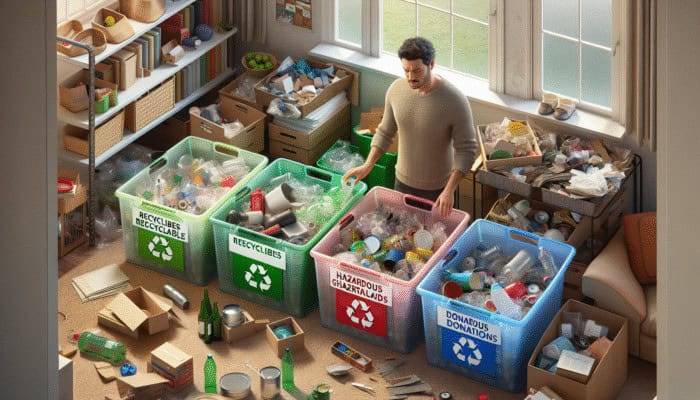
Efficient sorting is the cornerstone of effective recycling practices. By implementing systematic sorting techniques during your house clearance, you can significantly streamline the process. Start by categorising items into distinct groups: recyclables, non-recyclables, hazardous materials, and items designated for donation. This initial categorisation not only simplifies the disposal process but also maximises your recycling output.
Utilising clearly labelled bins or boxes for each category can effectively prevent cross-contamination. Ideally, these containers should be labelled to make sorting intuitive for everyone involved in the clearance process. Investing adequate time in this sorting phase can save you considerable effort in the long run, particularly when adhering to local recycling regulations.
For instance, recyclable paper and cardboard should be kept separate from plastics and metals. Ensure these materials are clean and dry before placing them in recycling bins, as contamination can render them unusable. Adopting these practices helps to maintain the integrity of the recycling stream while promoting environmental responsibility.
Importance of Labelling and Storage in the Recycling Process
Effective labelling and storage play a crucial role in maintaining an organised clearance operation. Once you’ve sorted your items, ensure that each category is distinctly labelled. This practice not only aids in identifying materials but also facilitates a smoother recycling process.
Consider employing colour-coded labels or symbols to differentiate between various material types. For example, blue could denote paper, green for glass, and yellow for plastics. This labelling system can greatly assist anyone involved in the clearance process, making it more efficient and less prone to errors.
Storage space is another vital consideration. Ensure that sorted items are kept in a clean, dry environment to avoid deterioration that may affect their recyclability. If space permits, grouping similar items can further aid in the recycling process. Thoughtful organisation can significantly improve your efficiency, ensuring that your house clearance is both effective and compliant with local recycling regulations.
Segregating Hazardous Waste Safely
The careful segregation of hazardous waste during house clearance necessitates a meticulous approach to ensure safety and compliance. This step is crucial, as improper handling can result in environmental damage and legal consequences. Start by identifying hazardous materials, which commonly include solvents, batteries, and certain electronic devices.
Establish a designated area for hazardous waste to prevent accidental contamination with other recyclables. This may be a labelled bin or a specific corner of your clearance area. When collecting hazardous items, ensure they are securely stored in their original containers whenever possible, as these are designed to contain the materials safely.
Reaching out to local hazardous waste disposal services is paramount for obtaining proper disposal guidance. Many councils offer specific drop-off points or collection services for hazardous materials, ensuring they are managed safely and responsibly. By prioritising the safe segregation of hazardous waste, you not only comply with UK laws but also contribute to fostering a healthier environment.
Understanding Recycling Facility Guidelines for Effective Disposal
Grasping the guidelines and procedures of local recycling facilities is essential for effective waste management during house clearance. Each facility may have varying requirements regarding the materials that can be accepted, how items should be prepared, and the procedures that must be followed upon arrival.
Before visiting a recycling centre, it is advisable to check their website or contact them directly to familiarise yourself with their specific guidelines. Some facilities may require that items be sorted in advance, while others may have designated days for specific types of waste. Being informed about these particulars can save you time and effort throughout your clearance operation.
Additionally, be mindful of any restrictions on the quantity or types of items that can be brought to the facility. For example, certain centres may limit the number of tyres or large appliances one can dispose of at a time. By adhering to facility guidelines, you enhance your recycling efforts and ensure you contribute positively to local waste management initiatives.
Selecting the Most Suitable Recycling Services
Ensuring Compliance with Licensed Waste Carriers
Choosing the right recycling services begins with verifying the credentials of licensed waste carriers. In the UK, it is a legal requirement to hire only licensed carriers for waste disposal, including during house clearance. Engaging an unlicensed carrier presents significant risks, including the potential for illegal dumping and subsequent fines for the homeowner.
To ensure compliance, verify the carrier’s registration with the relevant environmental authority, such as the Environment Agency or your local authority. This verification is straightforward and can often be accessed online. A reputable waste carrier will be transparent regarding their licensing and disposal practices.
When selecting a carrier, consider their area of specialisation. Some carriers specialise in specific waste types, such as electronics or construction debris, while others offer general waste disposal services. Understanding your specific clearance needs will help you choose the most suitable carrier. By making informed decisions, you can guarantee a compliant and environmentally friendly house clearance.
Utilising Local Recycling Centres Effectively
Recycling centres serve as vital resources for homeowners during house clearances. These facilities are specifically designed to manage a wide range of waste materials, providing sustainable disposal solutions. The first step is to locate your nearest recycling centre. Most local councils provide a comprehensive list of centres on their websites, detailing operating hours and the materials they accept.
When visiting a recycling centre, ensure you are aware of what items can be accepted. Many centres feature designated areas for different materials, such as plastics, metals, and garden waste. This segregation at the source is crucial for effective recycling outcomes.
Additionally, consider any potential costs associated with using certain recycling centres. While many offer free disposal for residential waste, some may impose fees for specific items. Being aware of these details can facilitate effective budgeting for your house clearance. By utilising local recycling centres, you support community recycling initiatives while contributing to environmental sustainability.
Engaging Specialist Recycling Services for Unique Waste Types
In certain situations, standard recycling services may fall short, particularly for specialised waste types. This is where engaging specialist recycling services becomes necessary. For instance, electronic waste requires specialised handling due to its hazardous components and the complexity of the materials involved. Collaborating with a specialist service guarantees compliance with regulations while promoting responsible recycling practices.
When seeking specialist services, research providers in your area that focus on specific waste categories, such as batteries, fluorescent tubes, or furniture. These services often possess the infrastructure required to process items responsibly, ensuring that valuable materials are reclaimed while hazardous components are disposed of safely.
It’s prudent to investigate user reviews and testimonials to assess the effectiveness and reliability of specialist services. This diligence pays off, leading to improved recycling outcomes and a reduced environmental impact. By recognising when to leverage specialist services, you can optimise your house clearance process and support a circular economy.
Implementing Eco-Friendly Disposal Methods
Exploring Reusing and Repurposing Opportunities
During house clearance, the potential for reusing and repurposing items should not be overlooked. Many household goods can have a second life, reducing waste and fostering creativity. Distinguishing between items suitable for reuse or repurposing is essential. Items such as furniture, decor, and even building materials can often be transformed rather than discarded.
Consider hosting a garage sale or utilising online platforms to sell valuable items. This not only helps declutter your space but also promotes sustainable practices by allowing others to use these goods. Additionally, many local charities are eager to accept donations of high-quality furniture, clothing, and household goods, thereby aiding those in need while preventing items from ending up in landfills.
For items that may not be directly suitable for reuse, consider creative repurposing options. For instance, old wooden pallets can be converted into garden furniture, while glass jars can serve as storage solutions. Embracing innovative thinking during your clearance not only minimises waste but also fosters a sense of community and responsibility.
Exploring Donation Options for Unwanted Items
Donating items that remain in good condition is one of the most impactful eco-friendly methods during a house clearance. Numerous charities and organisations welcome donations of clothing, furniture, and various household items. This act not only supports those in need but also plays a significant role in reducing overall waste.
Research local charities that align with your values. For example, Oxfam, the British Heart Foundation, and local homeless shelters often accept donations. Many charities even provide collection services, making it easier to donate larger items, such as furniture. Before donating, ensure the items are clean and in good working order to maximise their usefulness.
Furthermore, explore community initiatives that encourage sharing or swapping goods. Local Facebook groups or community centres may organise swap events where you can exchange items with others. This not only helps declutter your home but also promotes a sustainable lifestyle. By choosing to donate, you play a vital role in fostering a sense of community while simultaneously reducing waste.
Composting Organic Waste for a Sustainable Future
Composting organic waste generated during house clearance is an excellent, eco-friendly method of disposal. By diverting kitchen scraps, garden waste, and other organic materials from landfills, you contribute to reducing greenhouse gas emissions and create nutrient-rich compost for gardens.
Initiating a compost bin at home is a relatively straightforward process. Designate a space in your garden for composting and begin by layering organic materials. This includes fruit and vegetable scraps, coffee grounds, grass clippings, and even shredded paper. It is essential to maintain a balance between green materials (rich in nitrogen) and brown materials (rich in carbon) to facilitate the composting process.
Many local councils offer composting workshops or provide bins for residents to encourage this environmentally friendly practice. Engaging with these resources can enhance your composting efforts and promote a greener lifestyle. By composting organic waste, you not only reduce landfill contributions but also enrich your soil, supporting a sustainable ecosystem in your garden.
Identifying Local Recycling Facilities for Efficient Disposal
Identifying local recycling facilities is crucial during house clearance, as these centres accept various materials. Each facility may have specific guidelines regarding the materials it receives, making it vital to conduct research beforehand. Most local councils maintain a list of recycling facilities on their websites, outlining accepted items and operational hours.
When planning your clearance, categorise your items based on the requirements of each facility. Some centres may specialise in handling electronics, while others focus on plastics or metals. Understanding these distinctions ensures your materials are directed to the appropriate locations, maximising recycling success.
Additionally, many recycling facilities offer guidance on preparing items for recycling. For example, you may need to remove batteries from electronic devices or rinse containers before disposing of them. By adhering to these protocols, you contribute to the efficiency of the recycling process, ensuring materials are recycled responsibly.
Ensuring Safe Disposal of Hazardous Waste
The safe and eco-friendly disposal of hazardous waste is critical during house clearance. Many common household items, such as batteries, paints, and certain cleaning products, require special handling to prevent environmental damage. The UK has implemented strict regulations governing hazardous waste, mandating proper disposal methods.
Local councils often provide designated drop-off points for hazardous materials, ensuring they are treated and disposed of safely. Always check with your local authority to determine the locations of these facilities and the items they accept. Proper disposal not only complies with legal requirements but also ensures the protection of public health and environmental integrity.
Additionally, consider reaching out to specialist companies that focus on hazardous waste disposal. These providers are equipped to handle a range of materials safely, ensuring compliance with regulations. By prioritising proper disposal practices, you take a crucial step in protecting the environment and promoting sustainability during your house clearance.
Avoiding Common Mistakes in Recycling Practices
Preventing Contamination of Recyclables
Contamination of recyclables is a prevalent pitfall during house clearance that can undermine your recycling efforts. When non-recyclable items are inadvertently mixed with recyclables, they can render entire batches unusable, resulting in increased landfill waste. Understanding what constitutes contamination is vital for effective recycling.
Each local authority provides guidelines on accepted materials for recycling. Items such as greasy pizza boxes, contaminated food containers, and certain types of plastic can often lead to contamination issues. To avoid this, ensure that all recyclable materials are clean and dry before placing them into your recycling bin.
Educating everyone involved in the clearance process about proper recycling practices can help minimise contamination risks. Consider creating a quick reference guide that outlines what can be recycled and what cannot be recycled. By paying careful attention to these details, you enhance the effectiveness of your recycling efforts and contribute positively to local waste management initiatives.
Avoiding Improper Disposal of Electronics
Improper disposal of electronic waste poses significant environmental challenges and is a common mistake during house clearance. Many individuals are unaware that electronics contain hazardous materials, such as lead and mercury, which can leach into the environment if not disposed of correctly. In the UK, there are specific regulations governing the disposal of electronic items.
Local councils frequently organise designated e-waste recycling events or establish drop-off points to ensure safe disposal. It is crucial to utilise these services, as they are specifically designed to manage electronic waste responsibly. Additionally, many retailers offer take-back programmes for old electronics, allowing consumers to return items for recycling when purchasing new ones.
Before disposing of electronics, contemplate whether any items can be refurbished or donated. Numerous charities accept working devices to provide to those in need. This approach not only reduces waste but also extends the lifespan of electronic products. By prioritising proper disposal and exploring recycling options, you can significantly reduce the environmental impact associated with electronic waste.
Thoroughly Searching for Hidden Items During Clearance
One of the most common challenges during house clearance is inadvertently overlooking hidden items that could be recycled. Many individuals tend to focus primarily on larger, visible items and neglect smaller or less obvious materials. It is crucial to conduct a thorough examination of your home, including cupboards, drawers, and storage spaces, to identify all recyclable materials.
Consider creating a checklist of frequently overlooked items, such as batteries, light bulbs, and old electronics. These items typically require special handling, but can significantly contribute to your recycling efforts if managed properly.
Involving family members or friends in the clearance process can provide a fresh perspective and help identify overlooked items. This collaborative approach not only ensures a comprehensive clearance but also promotes collective responsibility for recycling and waste management. By being diligent and thorough, you can optimise your recycling efforts while ensuring compliance with UK regulations.
Understanding the Legal Consequences of Improper Waste Disposal
Awareness of Fines and Penalties for Non-Compliance
Recognising the legal consequences of improper waste disposal is essential for homeowners engaged in house clearance. In the UK, failing to comply with waste regulations can result in substantial fines and penalties. The Environmental Agency provides comprehensive guidelines and frameworks that outline the responsibilities of homeowners regarding waste management.
Fines can be considerable, with penalties potentially reaching thousands of pounds for severe breaches. Furthermore, improper disposal can lead to criminal charges in certain cases, resulting in prosecution. Homeowners must take these regulations seriously, ensuring that all waste is disposed of responsibly and in accordance with the law.
To avoid legal repercussions, always engage licensed waste carriers and adhere to local authority guidelines. Educating yourself about the rules and regulations concerning waste disposal empowers you to make informed decisions during your clearance process. By prioritising compliance, you protect yourself against potential legal issues while contributing positively to environmental health.
Assessing the Environmental Impact of Illegal Dumping
The environmental consequences of illegal dumping during house clearance are profound and far-reaching. When waste is improperly disposed of, it can lead to significant pollution of land, air, and water systems. Hazardous materials, in particular, pose substantial risks, as they can leach into soil and waterways, adversely affecting wildlife and human health.
In the UK, the government has implemented various strategies to combat illegal dumping; however, community awareness and responsibility play a critical role in its prevention. By engaging in responsible waste management practices, homeowners can significantly reduce their environmental footprint and contribute to sustainability efforts.
Moreover, public awareness campaigns highlight the importance of recycling and proper disposal methods. Engaging with these initiatives fosters a sense of community responsibility and encourages individuals to take action. By making informed choices during house clearance, homeowners can help create a cleaner, healthier environment for future generations.
Comprehending Your Legal Responsibilities During Clearance
Homeowners have specific legal responsibilities during house clearance, particularly concerning waste management. Under the Environmental Protection Act 1990, individuals are required to ensure that their waste is disposed of lawfully and responsibly. This encompasses the use of registered waste carriers and compliance with local authority regulations.
Failure to meet these legal obligations can result in fines, as previously mentioned, but it also has broader implications for the community and environment. Homeowners are encouraged to maintain records of their waste disposal activities, including receipts from licensed carriers, as proof of compliance with applicable regulations.
Proactively understanding your legal responsibilities not only protects you from penalties but also promotes responsible behaviour within your community. Engaging in educational resources or local initiatives can further enhance your awareness of waste management laws. By fulfilling your legal obligations, you contribute to a culture of sustainability and accountability.
Frequently Asked Questions About UK Recycling
What are the primary UK recycling laws I should be aware of?
The primary recycling laws in the UK encompass the Environmental Protection Act 1990 and the Hazardous Waste Regulations 2005, which outline the responsibilities for waste management and disposal practices.
How can I ensure the safe disposal of hazardous materials during a house clearance?
To ensure the safe disposal of hazardous materials, identify them, store them securely, and contact local recycling centres or hazardous waste disposal services for guidance.
What types of materials can be recycled in the UK?
In the UK, commonly recyclable materials include paper, cardboard, glass, metals, specific plastics, and certain textiles, depending on local council guidelines.
How can I sort and categorise items effectively during a house clearance?
To sort and categorise items effectively, create distinct groups for recyclables, non-recyclables, hazardous materials, and items for donation, using clear bins for organisation.
What services do licensed waste carriers offer?
Licensed waste carriers ensure the safe and compliant disposal of various waste types, processing items in accordance with UK regulations and environmental standards.
Where can I locate local recycling centres?
Local recycling centres can typically be found on your local council’s website, which provides information about accepted materials and operational hours.
What should I do with electronic waste during house clearance?
Electronic waste should be taken to designated recycling facilities or special collection events, as it requires proper handling due to its hazardous components.
How can I donate items in good condition during a house clearance?
Items in good condition can be donated to local charities, thrift shops, or community groups that accept donations, often providing collection services for larger items.
What are the penalties for improper waste disposal in the UK?
Penalties for improper waste disposal in the UK can include substantial fines and potential criminal charges, emphasising the importance of complying with waste management regulations.
How can I avoid contamination of recyclables?
To avoid contamination, ensure that all recyclable materials are clean and dry before disposal, and familiarise yourself with local recycling guidelines to know what can be recycled.


